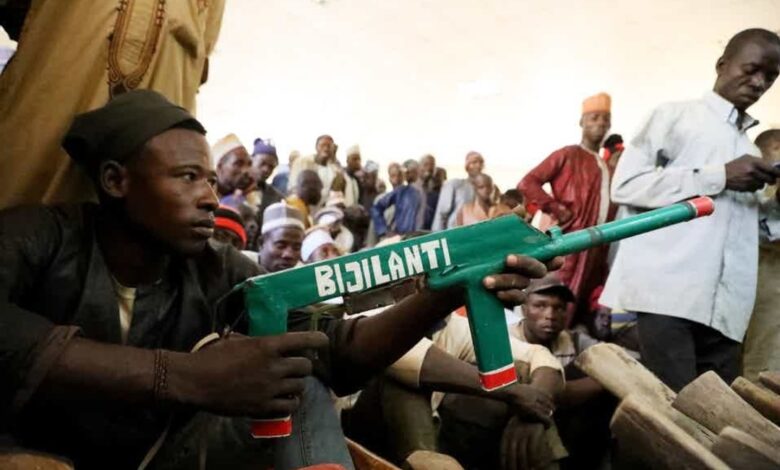In Many Parts Of Nigeria, Vigilante Groups Are Filling Security Gaps – Report
To reduce vigilante groups in the country, the government needs to improve security and boost the judiciary’s capacity to deter crime and restore trust in the justice system, according to a new Crisis Group report

Nigeria is wrestling with the proliferation of vigilante groups, because the government and police are increasingly unable to curb insecurity across the country, according to a new report by the International Crisis Group,
The Crisis Group report “Managing Vigilantism in Nigeria: A Near-term Necessity” highlights how vigilante groups with poor training, supervision, and prone to human rights abuses are filling security gaps and the risks associated with their activities including: aggravating intercommunal tensions, and increasing risks of conflict.
HumAngle had previously reported the impacts of vigilantism in the northwest where volunteer self-defence groups known as Yan Sa Kai, with ties to farming communities, have engaged in extrajudicial actions against pastoralists. These atrocities have led to attacks by the terror groups affiliated with the pastoralist communities.
The Crisis Group report reveals that vigilante groups in the country consisting of volunteers and state-sponsored groups have been influenced particularly since the mid-2010s by several factors including the Boko Haram insurgency in the northeast; the protracted ethno religious conflict in the north-central; the escalation of herder-farmer violence and the rise of violent crime, especially in the northwest, as well as in cities and on highways.
“These challenges have overwhelmed the police force, which is underfunded, understaffed and under-equipped,” the report said.
“As they must often await orders from their federal headquarters, the police seem increasingly unable to respond swiftly to distress calls in many places. Many Nigerians have lost faith in the federal government’s commitment to protecting all citizens in all parts of the country equally.”
It added that vigilantes have become so important to protecting the Nigerian public that for now, the country has little choice but to rely on them. The report also stated that yet there are dangers and authorities should better regulate these groups while working to restore citizens’ trust in the police.
The Crisis Group also advised that to provide better security and counter impunity, the government should pursue long-overdue police reform and boost the force’s funding and manpower.
This, it noted, is in addition to strengthening the judiciary’s capacity to deter crime and restore trust in the justice system as well as mechanisms to better manage vigilante groups and risks associated with their operations.
Support Our Journalism
There are millions of ordinary people affected by conflict in Africa whose stories are missing in the mainstream media. HumAngle is determined to tell those challenging and under-reported stories, hoping that the people impacted by these conflicts will find the safety and security they deserve.
To ensure that we continue to provide public service coverage, we have a small favour to ask you. We want you to be part of our journalistic endeavour by contributing a token to us.
Your donation will further promote a robust, free, and independent media.
Donate HereStay Closer To The Stories That Matter




